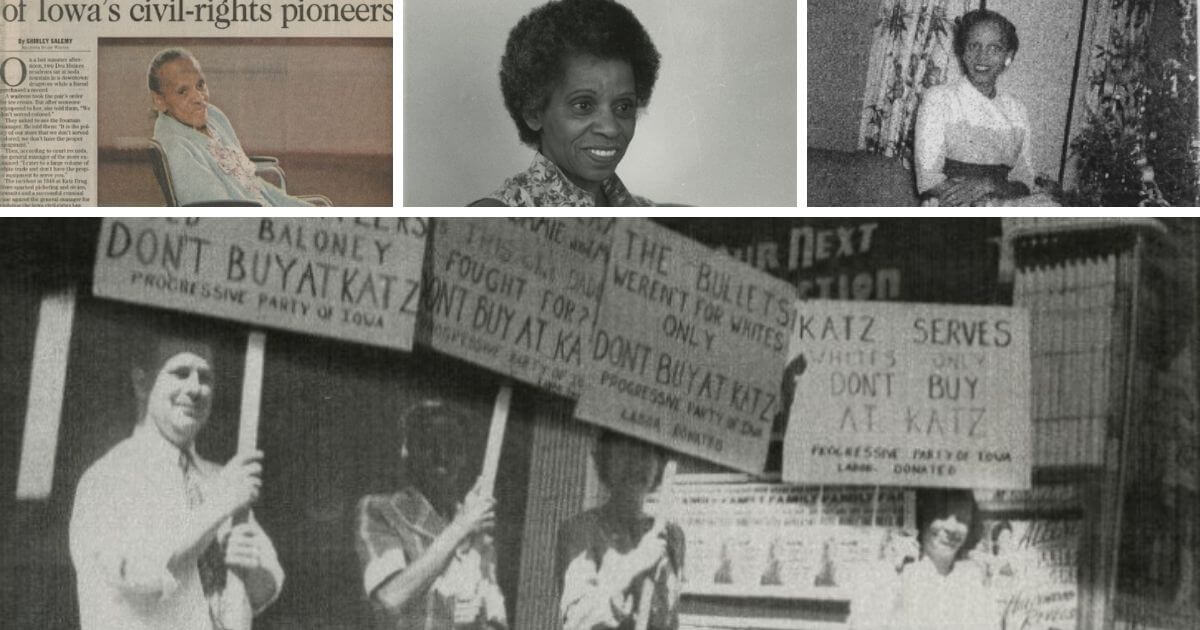
Photos: University of Iowa Libraries Iowa Women's Archives
The Edna Griffin Building in downtown Des Moines commemorates the Black woman who took a discrimination case to the Iowa Supreme Court and secured a significant victory under the then-hard-to-enforce 1884 Iowa Civil Rights Act.
It all started in July 1948 when Griffin, John Bibbs, and Leonard Hudson stopped at the Katz Drug Store in downtown Des Moines. The group ordered refreshments at the counter and was ultimately refused service because of their race.
In response, Griffin organized.
She and other members of the Progressive Party of Iowa picketed in front of the store every Saturday for two months. Griffin, along with Bibbs and Hudson, also filed charges against the store owner. They cited the 1884 Iowa Civil Rights Act, which prohibited discrimination in a public place.
[inline-ad id=”1″]
To this point, the drug store had racked up nearly 20 complaints–nine civil actions and 10 criminal. Criminal actions in 1943, 1944, and 1947 had all ended in acquittal or the charges being dropped.
But this time, the jury ruled in Griffin’s favor. Drug store owner Maurice Katz was fined $50. It didn’t end there, though, because Katz appealed the decision.
Griffin also filed a civil suit in the Polk County District Court for $10,000 in damages. Again, she won and the all-white jury awarded her $1.
The criminal case went all the way up to the Iowa Supreme Court, where the justices unanimously upheld the lower court’s decision in Griffin’s favor.
[inline-ad id=”2″]
Before this, convictions under the 1884 Iowa Civil Rights Act were rare because of ineffective enforcement mechanisms.
As the case worked through the court system, the protests at the Katz store continued into late 1949. Eventually, they also staged “sit-downs,” where protestors sat at the counter and waited, however long it took, to get service. Griffin and others were refused service again in November 1949, and they brought more civil suits against Katz to force his hand.
This pressure campaign finally worked. On Dec. 2, 1949, just before the Supreme Court decision on Dec. 13, 1949, Katz gave in. Just like that, eight civil suits and six criminal charges were dismissed and a $1,000 settlement was distributed.
Historians say it was possible because the sustained effort drew enough attention to the case that it was unable to be ignored.
[inline-ad id=”3″]
The former Katz building now houses a Kum & Go store, a physical therapy clinic, a photographer, and apartments. It is also called the Edna Griffin Building and is on the National Register of Historic Places.
by Nikoel Hytrek
02/16/22
Iowa Starting Line is part of an independent news network and focuses on how state and national decisions impact Iowans’ daily lives. We rely on your financial support to keep our stories free for all to read. You can contribute to us here. Also follow us on Facebook and Twitter.
[inline-ad id=”0″]
Support Our Cause
Thank you for taking the time to read our work. Before you go, we hope you'll consider supporting our values-driven journalism, which has always strived to make clear what's really at stake for Iowans and our future.
Since day one, our goal here at Iowa Starting Line has always been to empower people across the state with fact-based news and information. We believe that when people are armed with knowledge about what's happening in their local, state, and federal governments—including who is working on their behalf and who is actively trying to block efforts aimed at improving the daily lives of Iowan families—they will be inspired to become civically engaged.


Iowa Republicans make outlawing gay marriage key 2024 campaign priority
Iowa Republicans have made outlawing gay marriage a key goal in their 2024 party platform. During the Iowa GOP’s 2024 state convention on Saturday,...

Department of Justice says Iowa immigration law violates US Constitution
If Iowa doesn’t suspend the enforcement of its new immigration law by May 7, the state could face a federal lawsuit, according to the Des Moines...

Rushing: Iowa State president said the quiet part out loud
I want to thank Iowa State University President Wendy Wintersteen for doing us all a favor by finally saying the quiet part out loud: all the...

Iowa sets aside almost $180 million for year two of voucher program
Iowa has committed nearly $180 million in taxpayer funds to support private school tuition in the 2024-25 school year, which is almost $50 million...

Kalbach: Immediate action needed on corporate ag pollution
Iowa agriculture has undergone substantial changes over the past 40 years. We see it all around us. Rather than crops and livestock being raised on...

VIDEO: Jochum calls Gov. Reynolds’ summer meal program a ‘hunger game’
Iowa Gov. Reynolds announced a competitive $900,000 grant program to feed Iowa children over the summer, months after she declined $29 million in...





